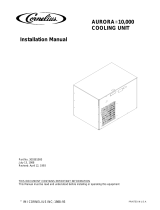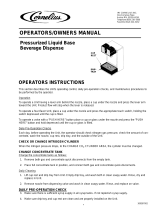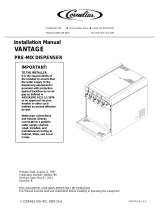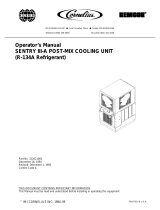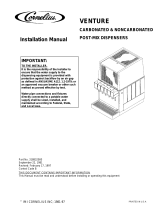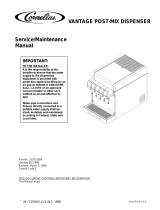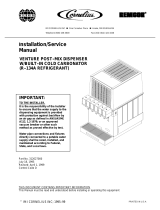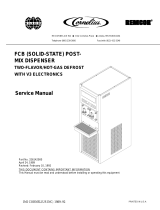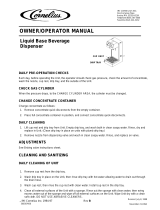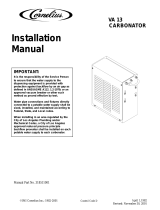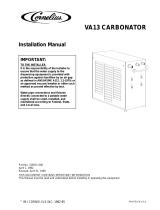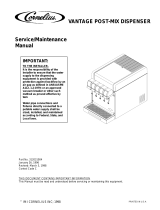Page is loading ...

AURORAR10,000 PLUS
COOLING UNIT
Installation Manual
PRINTED IN U.S.A
IMI CORNELIUS INC; 1989--93Ó
Part No. 300614000
November 8, 1989
Revised: April 12, 1993
THIS DOCUMENT CONTAINS IMPORTANT INFORMATION
This Manual must be read and understood before installing or operating this equipment

i 300614000
TABLE OF CONTENTS
Page
GENERAL INFORMATION 1. . . . . . . . . . . . . . . . . . . . . . . . . . . . . . . . . . . . . . . . . . . . . . . . . .
GENERAL DESCRIPTION 1. . . . . . . . . . . . . . . . . . . . . . . . . . . . . . . . . . . . . . . . . . . . . .
COOLING UNIT DESCRIPTION 1. . . . . . . . . . . . . . . . . . . . . . . . . . . . . . . . . . . . . . . . .
SYSTEM THEORY OF OPERATION 3. . . . . . . . . . . . . . . . . . . . . . . . . . . . . . . . . . . . .
INSTALLATION 5. . . . . . . . . . . . . . . . . . . . . . . . . . . . . . . . . . . . . . . . . . . . . . . . . . . . . . . . . . . .
UNPACKING AND INSPECTION 5. . . . . . . . . . . . . . . . . . . . . . . . . . . . . . . . . . . . . . . .
IDENTIFICATION OF LOOSE-SHIPPED PARTS 5. . . . . . . . . . . . . . . . . . . . . . . . . . .
SELECTING LOCATION 5. . . . . . . . . . . . . . . . . . . . . . . . . . . . . . . . . . . . . . . . . . . . . . . .
COOLING UNIT 5. . . . . . . . . . . . . . . . . . . . . . . . . . . . . . . . . . . . . . . . . . . . . . . . . . .
REMOTE CONDENSER COIL AND FAN ASS’Y 6. . . . . . . . . . . . . . . . . . . . . . .
INSTALLING REMOTE CONDENSER COIL AND FAN ASS’Y 6. . . . . . . . . . . . . . .
INSTALLING COOLING UNIT 6. . . . . . . . . . . . . . . . . . . . . . . . . . . . . . . . . . . . . . . . . . .
PLACING COOLING UNIT IN LOCATION 6. . . . . . . . . . . . . . . . . . . . . . . . . . . .
CONNECTING REMOTE CONDENSER COIL AND FAN ASS’Y
REFRIGERATION LINES TO COOLING UNIT 6. . . . . . . . . . . . . . . . . . . . . . . .
CONNECTING ELECTRICAL POWER CIRCUIT TO COOLING UNIT 7. . . .
CONNECTING ELECTRICAL POWER CIRCUIT TO REMOTE
CONDENSER COIL AND FAN ASS’Y 8. . . . . . . . . . . . . . . . . . . . . . . . . . . . . . . .
CONNECTING PLAIN WATER INLET SUPPLY LINE TO COOLING UNIT 8
CONNECTING CO2 INLET SUPPLY LINE TO COOLING UNIT 9. . . . . . . . .
CONNECTING SYRUP SOURCE LINES TO COOLING UNIT SYRUP
INLET LINES 9. . . . . . . . . . . . . . . . . . . . . . . . . . . . . . . . . . . . . . . . . . . . . . . . . . . . .
CONNECTING COOLING UNIT SYRUP OUTLET LINES TO INSULATED
PYTHON SYRUP LINES 9. . . . . . . . . . . . . . . . . . . . . . . . . . . . . . . . . . . . . . . . . . .
CONNECTING COOLING UNIT PLAIN WATER OUTLET LINES TO
INSULATED PYTHON PLAIN WATER LINES 9. . . . . . . . . . . . . . . . . . . . . . . . .
CONNECTING COOLING UNIT CARBONATED WATER OUTLET LINES TO
INSULATED PYTHON CARBONATED WATER LINES 9. . . . . . . . . . . . . . . . .
PLACING COOLING UNIT IN OPERATING POSITION 10. . . . . . . . . . . . . . . . . . . . .
PREPARING COOLING UNIT FOR OPERATION 10. . . . . . . . . . . . . . . . . . . . . . . . . .
OPERATION 11. . . . . . . . . . . . . . . . . . . . . . . . . . . . . . . . . . . . . . . . . . . . . . . . . . . . . . . . . .
LEAK CHECK AND INSULATING COOLING UNIT OUTLET LINES 12. . . . . . . . . .
DISPENSING STATION ADJUSTMENTS 12. . . . . . . . . . . . . . . . . . . . . . . . . . . . . . . . .
ADJUSTING WATER FLOW RATE 12. . . . . . . . . . . . . . . . . . . . . . . . . . . . . . . . . .
ADJUSTING WATER-TO-SYRUP ‘‘RATIO’’ OF DISPENSED PRODUCT 12
INSTALLING LINE IDENTIFICATION LABEL 12. . . . . . . . . . . . . . . . . . . . . . . . . . . . . .
OPERATORS INSTRUCTIONS 13. . . . . . . . . . . . . . . . . . . . . . . . . . . . . . . . . . . . . . . . . . . . . .
OPERATING CONTROLS 13. . . . . . . . . . . . . . . . . . . . . . . . . . . . . . . . . . . . . . . . . . . . . .
COOLING UNIT REFRIGERATION POWER SWITCH 13. . . . . . . . . . . . . . . . .
COOLING UNIT CARBONATOR MOTOR SWITCH 13. . . . . . . . . . . . . . . . . . . .
COOLING UNIT CIRCULATING MOTOR SWITCH 13. . . . . . . . . . . . . . . . . . . . .
REFRIGERATION SYSTEM TEMPERATURE SENSING DEVICE AND
HIGH-PRESSURE CUTOUT SWITCH 13. . . . . . . . . . . . . . . . . . . . . . . . . . . . . . .
DAILY PRE-OPERATION CHECK 14. . . . . . . . . . . . . . . . . . . . . . . . . . . . . . . . . . . . . . . .
ADJUSTMENTS 14. . . . . . . . . . . . . . . . . . . . . . . . . . . . . . . . . . . . . . . . . . . . . . . . . . . . . . .

ii
300614000
TABLE OF CONTENTS (cont’d)
Page
ADJUSTING CO2 REGULATORS 14. . . . . . . . . . . . . . . . . . . . . . . . . . . . . . . . . . .
ADJUSTING DISPENSING VALVES WATER FLOW RATE 14. . . . . . . . . . . . .
ADJUSTING WATER-TO-SYRUP ‘‘RATIO’’ OF DISPENSED PRODUCT 14.
ADJUSTING SIZE OF DRINK DISPENSED 14. . . . . . . . . . . . . . . . . . . . . . . . . . .
REPLENISHING CO2 SUPPLY 14. . . . . . . . . . . . . . . . . . . . . . . . . . . . . . . . . . . . . . . . . .
REPLENISHING SYRUP SUPPLY 14. . . . . . . . . . . . . . . . . . . . . . . . . . . . . . . . . . .
CLEANING AND SANITIZING 14. . . . . . . . . . . . . . . . . . . . . . . . . . . . . . . . . . . . . . . . . . .
DAILY CLEANING 14. . . . . . . . . . . . . . . . . . . . . . . . . . . . . . . . . . . . . . . . . . . . . . . . .
SANITIZING SYRUP SYSTEMS 15. . . . . . . . . . . . . . . . . . . . . . . . . . . . . . . . . . . . .
COOLING UNIT MAINTENANCE 15. . . . . . . . . . . . . . . . . . . . . . . . . . . . . . . . . . . . . . . .
COOLING UNIT AIR INTAKE AND EXHAUST FILTERS 15. . . . . . . . . . . . . . . .
CHECKING ICE WATER BATH 15. . . . . . . . . . . . . . . . . . . . . . . . . . . . . . . . . . . . . .
COOLING UNIT CARBONATOR MAINTENANCE 15. . . . . . . . . . . . . . . . . . . . .
DOUBLE LIQUID CHECK VALVE ASSEMBLIES YEARLY MAINTENANCE
(OR AFTER WATER SYSTEM DISRUPTIONS). 15. . . . . . . . . . . . . . . . . . . . . . .
COOLING UNIT CARBONATED WATER CIRCULATING PUMP MOTOR
LUBRICATION 15. . . . . . . . . . . . . . . . . . . . . . . . . . . . . . . . . . . . . . . . . . . . . . . . . . . .
REMOTE CONDENSER COIL AND FAN ASS’Y MAINTENANCE 16. . . . . . . . . . . .
CLEANING CO2 GAS CHECK VALVES 16. . . . . . . . . . . . . . . . . . . . . . . . . . . . . . . . . .
SERVICE AND MAINTENANCE 17. . . . . . . . . . . . . . . . . . . . . . . . . . . . . . . . . . . . . . . . . . . . .
COOLING UNIT MAINTENANCE 17. . . . . . . . . . . . . . . . . . . . . . . . . . . . . . . . . . . . . . . .
PERIODIC CLEANING 17. . . . . . . . . . . . . . . . . . . . . . . . . . . . . . . . . . . . . . . . . . . . .
CLEANING COOLING UNIT AIR INTAKE AND EXHAUST FILTERS. 17. . . . .
PREPARING COOLING UNIT FOR SHIPPING, STORING, OR RELOCATING 17
PERIODIC INSPECTION 17. . . . . . . . . . . . . . . . . . . . . . . . . . . . . . . . . . . . . . . . . . . . . . .
REMOTE CONDENSER COIL AND FAN ASSEMBLY MAINTENANCE 18. . . . . . .
CHECKING ICE WATER BATH 18. . . . . . . . . . . . . . . . . . . . . . . . . . . . . . . . . . . . . .
CHANGING ICE WATER BATH 18. . . . . . . . . . . . . . . . . . . . . . . . . . . . . . . . . . . . .
DOUBLE LIQUID CHECK VALVE ASSEMBLIES YEARLY MAINTENANCE
(OR AFTER WATER SYSTEM DISRUPTIONS) 19. . . . . . . . . . . . . . . . . . . . . . .
LUBRICATION 21. . . . . . . . . . . . . . . . . . . . . . . . . . . . . . . . . . . . . . . . . . . . . . . . . . . . . . . .
ADJUSTMENTS 21. . . . . . . . . . . . . . . . . . . . . . . . . . . . . . . . . . . . . . . . . . . . . . . . . . . . . . .
PRIMARY CO2 REGULATOR 21. . . . . . . . . . . . . . . . . . . . . . . . . . . . . . . . . . . . . . .
SECONDARY CO2 REGULATORS 21. . . . . . . . . . . . . . . . . . . . . . . . . . . . . . . . . .
WATER FLOW RATE 22. . . . . . . . . . . . . . . . . . . . . . . . . . . . . . . . . . . . . . . . . . . . . .
WATER-TO-SYRUP ‘‘RATIO’’ OF DISPENSED PRODUCT 22.............
CLEANING AND SANITIZING 22. . . . . . . . . . . . . . . . . . . . . . . . . . . . . . . . . . . . . . . . . . .
DAILY CLEANING OF UNIT 22. . . . . . . . . . . . . . . . . . . . . . . . . . . . . . . . . . . . . . . .
SANITIZING POST-MIX SYRUP SYSTEMS 23. . . . . . . . . . . . . . . . . . . . . . . . . .
REPLENISHING CO2 SUPPLY 26. . . . . . . . . . . . . . . . . . . . . . . . . . . . . . . . . . . . . . . . . .
REPLENISHING SYRUP SUPPLY 26. . . . . . . . . . . . . . . . . . . . . . . . . . . . . . . . . . . . . . .
SYRUP FLAVOR CHANGE 27. . . . . . . . . . . . . . . . . . . . . . . . . . . . . . . . . . . . . . . . . . . . .
CLEANING CO2 SYSTEM GAS CHECK VALVES 27. . . . . . . . . . . . . . . . . . . . . . . . . .
SECONDARY CO2 REGULATORS AND CO2 MANIFOLD CO2 GAS
CHECK VALVES 27. . . . . . . . . . . . . . . . . . . . . . . . . . . . . . . . . . . . . . . . . . . . . . . . . .

iii 300614000
TABLE OF CONTENTS (cont’d)
Page
COOLING UNIT CO2 INLET LINE CO2 GAS CHECK VALVE 27. . . . . . . . . . .
TROUBLESHOOTING 30. . . . . . . . . . . . . . . . . . . . . . . . . . . . . . . . . . . . . . . . . . . . . . . . . . . . . .
WATER-TO-SYRUP ‘‘RATIO’’ OF DISPENSED DRINK TOO LOW OR TOO
HIGH. 30. . . . . . . . . . . . . . . . . . . . . . . . . . . . . . . . . . . . . . . . . . . . . . . . . . . . . . . . . . . . . . . .
ADJUSTMENT OF DISPENSING VALVE SYRUP FLOW REGULATOR DOES
NOT INCREASE TO DESIRED WATER-TO-SYRUP ‘‘RATIO”. 30. . . . . . . . . . . . . . .
ADJUSTMENT OF DISPENSING VALVE SYRUP FLOW REGULATOR DOES
NOT DECREASE TO DESIRED WATER-TO- SYRUP ‘‘RATIO’’. 31. . . . . . . . . . . . .
DISPENSED PRODUCT CARBONATION TOO LOW. 31. . . . . . . . . . . . . . . . . . . . . .
DISPENSED PRODUCT COMES OUT OF DISPENSING VALVE CLEAR BUT
FOAMS IN CUP. 31. . . . . . . . . . . . . . . . . . . . . . . . . . . . . . . . . . . . . . . . . . . . . . . . . . . . . . .
DISPENSED PRODUCT PRODUCES FOAM AS IT LEAVES DISPENSING
VALVE. 31. . . . . . . . . . . . . . . . . . . . . . . . . . . . . . . . . . . . . . . . . . . . . . . . . . . . . . . . . . . . . . .
ONLY CARBONATED WATER DISPENSED. 31. . . . . . . . . . . . . . . . . . . . . . . . . . . . . .
ONLY SYRUP DISPENSED. 32. . . . . . . . . . . . . . . . . . . . . . . . . . . . . . . . . . . . . . . . . . . .
WARM PRODUCT BEING DISPENSED. 32. . . . . . . . . . . . . . . . . . . . . . . . . . . . . . . . . .
WATER PUMP MOTOR WILL NOT OPERATE. 32. . . . . . . . . . . . . . . . . . . . . . . . . . . .
WATER PUMP MOTOR WILL NOT SHUT OFF. 32. . . . . . . . . . . . . . . . . . . . . . . . . . .
ERRATIC CYCLING OF CARBONATOR. 32.................................
WATER PUMP MOTOR OPERATES BUT WATER PUMP DOES NOT PUMP
WATER. 33. . . . . . . . . . . . . . . . . . . . . . . . . . . . . . . . . . . . . . . . . . . . . . . . . . . . . . . . . . . . . .
WATER PUMP CAPACITY TOO LOW. 33. . . . . . . . . . . . . . . . . . . . . . . . . . . . . . . . . . .
COMPRESSOR DOES NOT OPERATE. 33. . . . . . . . . . . . . . . . . . . . . . . . . . . . . . . . . .
COMPRESSOR OPERATES CONTINUOUSLY BUT DOES NOT FORM
SUFFICIENT ICE BANK 34. . . . . . . . . . . . . . . . . . . . . . . . . . . . . . . . . . . . . . . . . . . . . . . .
CONDENSER FAN MOTOR NOT OPERATING 35. . . . . . . . . . . . . . . . . . . . . . . . . . .
AGITATOR MOTOR NOT OPERATING. 35. . . . . . . . . . . . . . . . . . . . . . . . . . . . . . . . . .
WARRANTY 36. . . . . . . . . . . . . . . . . . . . . . . . . . . . . . . . . . . . . . . . . . . . . . . . . . . . . . . . . . . . . .
LIST OF FIGURES
FIGURE 1. AURORAR10,000 PLUS COOLING UNIT 1. . . . . . . . . . . . . . . . . . . . . . .
FIGURE 2. FLOW DIAGRAM (TYPICAL INSTALLATION) 4. . . . . . . . . . . . . . . . . . .
FIGURE 3. 240/24VAC POWER TRANSFORMER 7.........................
FIGURE 4. COOLING UNIT SPACE REQUIRED 10. . . . . . . . . . . . . . . . . . . . . . . . . . .
FIGURE 5. PARTS IDENTIFICATION 20. . . . . . . . . . . . . . . . . . . . . . . . . . . . . . . . . . . .
FIGURE 6. LIQUID CHECK VALVE ASSEMBLY 22. . . . . . . . . . . . . . . . . . . . . . . . . . .
FIGURE 7. CO2 GAS CHECK VALVE 26. . . . . . . . . . . . . . . . . . . . . . . . . . . . . . . . . . . .
FIGURE 8. REFRIGERATION FLOW DIAGRAM (REQUIRES CONNECTION TO
REMOTE CONDENSER COIL AND FAN ASS’Y) 28..........................
FIGURE 9. WIRING DIAGRAM 29. . . . . . . . . . . . . . . . . . . . . . . . . . . . . . . . . . . . . . . . . .
LIST OF TABLES
TABLE 1. DESIGN DATA 2. . . . . . . . . . . . . . . . . . . . . . . . . . . . . . . . . . . . . . . . . . . . . . .
TABLE 2. LOOSE-SHIPPED PARTS 5. . . . . . . . . . . . . . . . . . . . . . . . . . . . . . . . . . . . .

1
300614000
GENERAL INFORMATION
IMPORTANT: To the user of this manual - This manual is a guide for installing, operating, and
maintaining this equipment. Refer to Table of Contents for page location of detailed information
pertaining to questions that arise during installation, operation, service and maintenance, or
troubleshooting this equipment.
GENERAL DESCRIPTION
This section gives the description, theory of operation, and design data for the AuroraR10,000 Plus Cooling
Unit, hereafter referred too as a Cooling Unit.
COOLING UNIT DESCRIPTION
The Cooling Unit is designed to provide cooled syrup, carbonated water, and plain water to the dispensing
station through an insulated python (length as ordered). The Cooling Unit refrigeration system is cooled by a
Remote Condenser Coil and Fan Assembly which is connected to the Cooling Unit.
The Cooling Unit consists of a refrigeration system with a two horsepower compressor and a Hydro BoostR
(plain water pre-cooler) which pre-cools plain water on its way to the carbonated water tank. The Cooling Unit
also consists of a plain water pump. The plain water pump pumps plain water through the Hydro BoostR ,
through the plain water cooling coils, and into the carbonated water tank. The carbonated water circulating
pump circulates cold carbonated water from the Cooling Unit to the dispensing station and back to the Cooling
Unit.
The cabinet panels are easily removed to facilitate installation and service and maintenance.
An optional Cooling Unit Stand (P/N 309309000) is available to elevate Cooling Unit up off floor. Also available
is an Aurora Service System Analyzer (P/N 30919700) that may be used to analyze and troubleshoot the
Cooling Unit refrigeration system.
CAUTION: Before shipping or relocating the Cooling Unit syrup cooling coils must be
sanitized and all sanitizing solution must be purged from the coils. All water must also be
purged from the plain and carbonated water systems. A freezing ambient environment will
cause residual sanitizing solution or water remaining inside the Cooling Unit to freeze resulting in
damage to internal components.
FIGURE 1. AURORAR10,000 PLUS COOLING UNIT

2
300614000
Table 1. Design Data
COOLING UNIT DATA
Model No. 416654
Overall Dimensions:
Height 25-inches
Width 36-1/2 inches
Depth 24-1/2 inches
NOTE: Overall dimensions if Cooling Unit is placed on optional Cooling Unit Stand (P/N 309309069).
Height (approximate) 72-5/16 inches
Width 37-1/2 inches
Depth 25-3/8 inches
Weights:
Shipping 385 pounds
Dry Weight pounds
Ice Bank Weight 40 ± pounds
Capacities:
Water Bath (no ice bank) 18 gallons
Compressor Horsepower 2 HP
Refrigeration System:
Refrigerant Type and Charge See Cooling Unit Nameplate
Ambient Operating Temp. 50° F to 100° F
Electrical Requirements:
Operating Voltage See Cooling
Unit
Nameplate
Current Draw
REMOTE CONDENSER COIL AND FAN ASS’Y DATA (P/N 309602000)
Overall Dimensions:
Height 27 inches
Width 22-inches
Depth 38-inches
Weight:
Shipping 85 pounds
Ambient Operating Temp. -22° F to 158° F
Electrical Requirements:
Operating Voltage 208/230VAC, Single Phase,
60Hz
Current Draw 2.5 Amps

3
300614000
SYSTEM THEORY OF OPERATION
(see Figure 2)
A CO
2
cylinder delivers carbon dioxide gas (CO
2
) to primary CO
2
regulator assembly which deliver regulated
CO
2
gas to adjustable secondary CO
2
regulators. Secondary CO
2
regulators delivers regulated CO
2
gas to the
carbonated water tank inside the Cooling Unit and also to the soft drink tanks. Plain water enters the Cooling
Unit and is pumped through and is pre-cooled by the refrigerated Hydro Boostâ coil. Cooled water continues
through the plain water cooling coils and into the carbonated water tank. Cold plain water entering the
carbonated water tank is carbonated by regulated CO
2
gas pressure also entering the tank. Carbonated water
leaves the carbonated water tank and enters the inlet side of the carbonated water circulating pump.
Carbonated water passes through the carbonated water circulating pump, through the carbonated water cooling
coil, and exits the Cooling Unit through an insulated python to a turnaround inside the dispensing station.
Carbonated water returns to the Cooling Unit by passing through the insulated python, through the Cooling Unit
carbonated water cooling coils, through the carbonated water tank which makes up the carbonated water
circulating system. As carbonated water is being dispensed from the dispensing station, carbonated water
circulating system is continuously being replenished from the carbonated water tank.
Plain water enters through the Cooling Unit two plain water inlet lines, through the plain water cooling coils, and
exists the Cooling Unit out through insulated python to the dispensing station. Regulated CO
2
gas pressure
exerted upon the soft drinks contents forces syrup from tanks, through Cooling Unit syrup inlet lines, through
syrup cooling coils, and exists the Cooling Unit out through an insulated python to the dispensing station.
The Cooling Unit refrigeration system is cooled by a Remote Condenser Coil and Fan Assembly (P/N
309602000) that is authorized by IMI Cornelius Inc. Use of any other Remote Condenser Coil and Fan
Assembly must be authorized by IMI Cornelius Inc. Use of an unauthorized Remote Condenser Coil and Fan
Assembly will automatically void the Cooling Unit factory warranty.

4
300614000
PLAIN WATER
SOURCE
SHUTOFF
VALVE
WATER PRESSURE
REGULATOR
WATER FILTER
ASS’Y
DIET SYRUP
CO
2
REGULATOR
SUGAR SYRUP
CO
2
REGULATOR
CARBONATOR
CO
2
REGULATOR
CO
2
MANIFOLD
CO
2
GAS CHECK
VALVE(10)
PRIMARY
CO
2
REGULATOR
CO
2
CYLINDER
SOFT DRINK TANKS(10)
CARBONATED WATER
TANK ASS’Y
TO
DISPENSING
STATION
HYDRO BOOSTR
BYPASS SHUTOFF
VALVE
HYDRO BOOSTR
COIL
LIQUID
CHECK
VALVE
CO
2
CHECK
VALVE
PLAIN
WATER PUMP
*WATER TANK
WATER LEVEL
CONTROL
CARBONATED WATER
CIRCULATING PUMP
*SOME COOLING UNITS MAY BE
EQUIPPED WITH THE WATER
LEVEL FLOAT CONTROL.
COOLING UNIT MODEL:
416654
COOLING UNIT
DOUBLE LIQUID
CHECK VALVE ASS’Y(2)
LINE LEGEND
CO
2
CARB WATER
PLAIN WATER
SYRUP
FIGURE 2. FLOW DIAGRAM (TYPICAL INSTALLATION)

5 300614000
INSTALLATION
This section covers unpacking and inspection, selecting location, installing the Cooling Unit and the Remote
Condenser Coil and Fan Assembly preparing for operation, and operation.
UNPACKING AND INSPECTION
NOTE: The Cooling Unit and the Remote Condenser Coil and Fan Assembly were thoroughly inspected
before leaving the factory and the carrier has accepted and signed for them. Any damage or
irregularities should be noted at time of delivery (or not later than 15 days from date of delivery) and
immediately reported to the delivering carrier. Request a written inspection report from Claims
Inspector to substantiate any necessary claim. File claim with the delivering carrier, not with IMI
Cornelius Inc.
1. After Cooling Unit has been unpacked, remove shipping tape and other packing material.
2. Unpack LOOSE-SHIPPED PARTS. Make sure all items are present and in good condition.
Table 2. Loose-Shipped Parts
Item
No. Part No. Name Qty.
1 309852000 Tubing Clamp 24
2 770407 Barbed Connector, 1/4 by 3/8 12
3 770424 Barbed Connector, 1/2 by 1/2 2
4 311962000 Label, Line Identification 1
NOTE: The following Remote Condenser Coil and Fan Assembly and Refrigeration Line Kits are rec-
ommended for use with Cooling Unit (P/N 416654000). Refrigeration Lines Kit (as ordered) is used to
connect Condenser Coil and Fan Assembly to the Cooling Unit.
5 309602000 Remote Condenser Coil and Fan Ass’y 1
6 300598025 Refrigeration Line Kit, 25-ft. long, 90 1
300598050 Refrigeration Line Kit, 50-ft. long, 90 1
IDENTIFICATION OF LOOSE-SHIPPED PARTS
1. BARBED CONNECTORS (item 2) used to connect Cooling Unit outlet lines to insulated python lines.
Connections are secured with TUBING CLAMPS (item 1).
2. BARBED CONNECTORS (item 3) are used to connect Cooling Unit outlet carbonated water lines to
insulated python lines.
3. LABEL, LINE IDENTIFICATION (item 4) to be installed on Cooling Unit and syrup flavors to be recorded in
proper spaces on label.
4. REFRIGERATION LINE KIT (items 6) is used to connect REMOTE CONDENSER COIL AND FAN ASS’Y
(item 5) to Cooling Unit.
SELECTING LOCATION
COOLING UNIT
Select location for Cooling Unit installation that will (1) Allow the shortest possible insulated python route from
the Cooling Unit to the Dispensing Station location; (2) Allow the shortest possible refrigeration lines (not to
exceed 50-ft in length) route from Remote Condenser Coil and Fan Assembly to the Cooling Unit; (3) REFER
TO THE COOLING UNIT NAMEPLATE FOR THE REQUIRED POWER CIRCUIT OPERATING VOLTAGE, HZ,
AND THE MINIMUM CIRCUIT AMPACITY OF THE COOLING UNIT. The power circuit for the Cooling Unit
must be wired through a 40-amp minimum rated disconnect switch (not provided) and the power circuit must be

6300614000
fused as indicated on the Unit nameplate. The power circuit may also be wired through an equivalent HACR
type circuit breaker rather then the disconnect switch. THE POWER CIRCUIT MUST BE MADE UP OF
COPPER CONDUCTORS AND ALL WIRING MUST CONFORM TO NATIONAL AND LOCAL ELECTRICAL
CODES; (4) Close to a plain water source supply line with proper requirements; (5) Sufficient space around
Cooling Unit (see Figure4) for proper air circulation (18-inches on sides and back, front side open to room, and
top open to ceiling); (6) Be close to permanent floor drain to route Cooling Unit water tank drain and overflow
hoses to the floor drain.
REMOTE CONDENSER COIL AND FAN ASS’Y
CAUTION: Remote Condenser Coil and Fan Assemblies authorized by IMI Cornelius Inc.
(P/N 309602000)
1. An extreme warm climate installation may require extra caution in Remote Condenser Coil and Fan
Assembly location. Avoid hot sunny locations and seek shaded area if possible. The use of a structure to
shade the Unit from direct sun exposure and/or a platform extending Unit an additional 18-inches above
the rooftop is highly recommended and will improve performance. Ample space must be provided on all
sides and above Unit for proper air circulation through Unit and also access for service and maintenance.
DO NOT BLOCK AIR CIRCULATION THROUGH UNIT.
2. Remote Condenser Coil and Fan Assembly must be installed in level position and must be anchored with
adequate fastening devices.
INSTALLING REMOTE CONDENSER COIL AND FAN ASS’Y
(see Figure 6)
1. Remote Condenser Coil and Fan Assembly must be installed meeting requirements of SELECTING
LOCATION. Remote Condenser Coil and Fan Assembly must be installed in a level position and must be
anchored with adequate fastening devices.
2. Route refrigeration lines of REFRIGERATION LINE KIT (item 6) from Remote Condenser Coil and Fan
Assembly down to Cooling Unit location.
3. Connect ends of refrigeration lines to Condenser Coil and Fan Assembly refrigeration connectors.
INSTALLING COOLING UNIT
NOTE: Cooling Unit outlet lines, plain water, CO
2
, and syrup inlet lines, Remote Condenser Coil and
Fan Assembly refrigeration lines and power circuit cable, and Cooling Unit power circuit cable each
must be long enough when connected to Cooling Unit to allow pulling Unit out approximately
36-inches from operating position for service and maintenance. When Cooling Unit is in operating
position, excess power circuit cable, Remote Condenser Coil and Fan Assembly refrigeration lines and
power circuit cable and plain water source and CO
2
inlet lines may be coiled up behind Unit.
PLACING COOLING UNIT IN LOCATION
NOTE: An optional Cooling Unit Stand (P/N 309309069) is available to elevate Cooling Unit up and off
the floor.
1. Place Cooling Unit in position approximately 36-inches out from operating position to allow access all
around the Unit.
2. Remove two screws securing Cooling Unit top cover, then remove cover.
CONNECTING REMOTE CONDENSER COIL AND FAN ASS’Y REFRIGERATION LINES
TO COOLING UNIT
(see Figure 5)
Connect refrigeration lines, from Remote Condenser Coil and Fan Assembly, to refrigeration connectors on front
of Cooling Unit.

7 300614000
CONNECTING ELECTRICAL POWER CIRCUIT TO COOLING Unit
(see Figures 5 and 9)
IMPORTANT: Before 208/230VAC single-phase 60Hz electrical power circuit is connected to the cooling
unit, service power voltage entering the building must be identified. Service power voltage entering the
building will either be 208 or 230VAC and may be posted on the main service box. If not, the installer
must contact the local electrical power company for information. If these two voltage identification
attempts should fail, a voltage reading Must be performed. If service power voltage is below 218VAC,
the red electrical wire connected to the 240VAC terminal on LINE (primary) side of the 240/24VAC power
transformer inside the cooling unit switches electrical control box (see Figure 3 and 9) must be
disconnected from the 240VAC terminal and be connected to the 208VAC terminal. If voltage is above
218VAC, power transformer red electrical wire will remain connected to the 240VAC terminal. If installer
is not sure of the service power voltage entering the building, leave red electrical wire connected to the
240VAC terminal on the power transformer. If service power voltage is below 218VAC, proceed as
follows:
1. Remove four screws securing electrical control box cover, then remove cover for access to the
240/24VAC power transformer.
2. Remove red electrical wire from the 240VAC terminal on LINE (primary) side of power transformer
and connect it to the 208VAC terminal.
RESET BUTTON
C
208V
240V
FIGURE 3. 240/24VAC POWER TRANSFORMER
WARNING: Make sure 40-amp minimum-rated disconnect switch (not provided) is in ‘ ‘OFF’’
position.
1. Remove cover from electrical handy box on back of Cooling Unit.
WARNING: The Cooling Unit must be electrically grounded to avoid possible fatal electrical
shock or serious injury to the operator. A green ground wire is provided inside electrical
box to connect power circuit ground wire which electrically grounds the Cooling Unit.
Connect 208/230VAC Single-Phase 60Hz power circuit from 40-amp minimum rated disconnect switch (not
provided) fused at 40-amps (‘‘slow-blow’’) to electrical wires inside electrical handy box on back of Cooling Unit.
COOLING UNIT MUST BE PROPERLY GROUNDED. POWER CIRCUIT MUST BE MADE UP OF COPPER
CONDUCTORS, AND ALL WIRING MUST CONFORM TO NATIONAL AND LOCAL ELECTRICAL CODES.
DO NOT CONNECT ELECTRICAL POWER TO COOLING UNIT AT THIS TIME.

8300614000
CONNECTING ELECTRICAL POWER CIRCUIT TO REMOTE CONDENSER COIL AND
FAN ASS’Y
(see Figure 5 and 9)
CAUTION: The Cooling Unit refrigeration system is cooled by a Remote Condenser Coil
and Fan Assembly (P/N 309602000) that is authorized by IMI Cornelius Inc. Use of an
unauthorized Remote Condenser Coil and Fan Assembly will automatically void the
Cooling Unit factory warranty.
NOTE: Electrical power circuit may be connected to the Remote Condenser Coil and Fan Assembly
(P/N 309602000) in two ways. The preferred way is to draw electrical power from the cooling unit
contactor which allows the Remote Condenser Coil and Fan Assembly to operate only when the
cooling unit refrigeration system is operating. The optional way is to connect a separate electrical
power circuit (independent of the cooling unit) through an appropriately rated and fused disconnect
switch or an equivalent HACR circuit breaker which allows the Remote Condenser Coil and Fan
Assembly to operate at all times (independent of cooling unit operation).
1. Connect and route electrical power circuit cable from Remote Condenser Coil and Fan Assembly through
fuse box (not provided), fused at 15-amps (maximum) down to Cooling Unit location. REMOTE
CONDENSER COIL AND FAN ASSEMBLY MUST BE PROPERLY GROUNDED, POWER CIRCUIT
MUST BE MADE UP OF COPPER CONDUCTORS, AND ALL WIRING MUST CONFORM TO NATIONAL
AND LOCAL ELECTRICAL CODES.
2. Route Remote Condenser Coil and Fan Assembly Power cable electrical wires through electrical handy
box on back of Cooling Unit to inside of electrical control box.
3. Connect Remote Condenser Coil and Fan Assembly power cable electrical wires to T
1
and T
2
terminals on
contactor inside Cooling Unit electrical control box.
4. Install electrical control box cover and secure with four screws.
5. Install cover on electrical handy box on back of Cooling Unit.
CONNECTING PLAIN WATER INLET SUPPLY LINE TO COOLING UNIT
(see Figure 2)
NOTE: IMI Cornelius Inc. recommends that a water shutoff valve be installed in plain water inlet supply
line connected to Cooling Unit and that water supply be filtered. WATER PIPE CONNECTIONS AND
FIXTURES DIRECTLY CONNECTED TO A POTABLE WATER SUPPLY SHALL BE SIZED, INSTALLED
AND MAINTAINED ACCORDING TO FEDERAL, STATE, AND LOCAL LAWS.
CAUTION: Plain water inlet supply line to Cooling Unit must be 1/2-inch I.D. minimum.
Check water flow rate of water inlet supply line. MINIMUM FLOW RATE MUST BE AT LEAST
300-GALLONS PER HOUR. If flow rate is less than 300-gallons per hour, ‘ ‘starving’’ of
carbonator water pump will occur. Starving will allow water pump to overheat causing safety
thermostat on pump outlet to disrupt electrical power to and stop water pump motor. Carbonated
water circulating pump overheating could occur if water inlet supply line flow rate drops below
300-gallons per hour. INCOMING PLAIN WATER INLET SUPPLY LINE WATER PRESSURE MUST
REMAIN A MINIMUM OF 10-PSI BELOW THE CARBONATOR CO
2
OPERATING PRESSURE.
(Example: Operating pressure is 90-psi and maximum water pressure can be no more than 80-psi,
etc.)
1. Before connecting plain water inlet supply line to Cooling Unit, open water line shutoff valve for a period of
time to flush out any metal shavings and other contaminates that may have resulted from plumbing
connections.

9 300614000
2. Connect flexible plain water inlet supply line (1/2-inch I.D. min.), meeting water inlet supply line
requirements of preceding CAUTION note, to Cooling Unit 3/8-in. flare (5/8-18) bulkhead fitting on back of
Unit labeled ‘‘WATER INLET’’. DO NOT OPEN WATER INLET SUPPLY LINE SHUTOFF VALVE AT THIS
TIME.
CONNECTING CO
2
INLET SUPPLY LINE TO COOLING UNIT
(see Figure 2)
WARNING: CO
2
displaces oxygen. Strict attention must be observed in the prevention of
CO
2
(carbon dioxide) gas leaks in the entire CO
2
and soft drink system. If a CO
2
gas leak is
suspected, particularly in a small area, immediately ventilate the contaminated area before
attempting to repair the leak. Personnel exposed to high concentration of CO
2
gas will experience
tremors which are followed rapidly by loss of consciousness and suffocation.
Connect flexible CO
2
inlet supply line to Cooling Unit 1/4-in. flare (7/16-20) bulkhead fitting of back of Unit
labeled “CO
2
INLET’’. DO NOT TURN ON CO
2
SUPPLY TO COOLING UNIT AT THIS TIME.
CONNECTING SYRUP SOURCE LINES TO COOLING UNIT SYRUP INLET LINES
(see Figure 2)
Connect syrup source lines, from No. 1 through No. 10 soft drink tanks location, to Cooling Unit syrup inlet lines
labeled No. 1 through No. 10. DO NOT CONNECT SOFT DRINK TANKS INTO SYRUP SYSTEMS AT THIS
TIME.
CONNECTING COOLING UNIT SYRUP OUTLET LINES TO INSULATED PYTHON SYRUP
LINES
(see Figure 2)
Connect Cooling Unit syrup outlet lines labeled No. 1 through No. 10, to insulated python lines labeled No. 1
though No. 10 using BARBED CONNECTORS (item 2). Secure connections with TUBING CLAMPS (item 1).
CONNECTING COOLING UNIT PLAIN WATER OUTLET LINES TO INSULATED PYTHON
PLAIN WATER LINES
(see Figure 2)
Connect Cooling Unit plain water outlet lines to insulated python plain water lines using BARBED
CONNECTORS (item 2). Secure connections with TUBING CLAMPS (item 1).
CONNECTING COOLING UNIT CARBONATED WATER OUTLET LINES TO INSULATED
PYTHON CARBONATED WATER LINES
(see Figure 2)
NOTE: The Cooling Unit carbonated water outlet lines are used to make up the carbonated water
circulating system between the Cooling Unit and the dispensing station as explained in SYSTEM
THEORY OF OPERATION in GENERAL INFORMATION SECTION.
Connect Cooling Unit carbonated water outlet lines to insulated python carbonated water lines using BARBED
CONNECTORS (item 3).

10300614000
18--IN.
18--IN.
18--IN.
COOLING UNIT
AIR FLOW
(OPEN TO ROOM)
FIGURE 4. COOLING UNIT SPACE REQUIRED
PLACING COOLING UNIT IN OPERATING POSITION
1. Very carefully, move Cooling Unit back into operating position leaving space around Unit (see Figure 4) as
specified in SELECTING LOCATION. MAKE SURE THERE ARE NO KINKS IN COOLING UNIT INLET
LINES, AND (IF APPLICABLE) REMOTE CONDENSER AND FAN ASSEMBLY REFRIGERATION LINES.
NOTE: To comply with National Sanitation Foundation (NSF) requirements, Cooling Unit not installed
on optional Cooling Unit Stand (P/N 309309-069) must have its base sealed to floor with Dow-Corning
RTV 731 or equivalent.
2. Tilt Cooling Unit up to expose bottom of Unit base.
3. Liberally apply silastic sealant such as Dow-Corning (RTV 731) or equivalent on Unit base bottom edges.
NOTE: Do not move Cooling Unit after positioning or seal from Unit base to floor will be broken.
4. Lower Cooling Unit into operating position to complete seal from Unit base to floor. Apply additional sealant
around bottom of base. Seal must have a minimum radius of 1/2-inch to prevent cracks and crevices and
to ensure a complete seal.
5. Route Cooling Unit water tank overflow hose to permanent floor drain.
6. Seal area around drain and overflow hoses where they exit from Unit using Dow Corning (RTV 731) or
equivalent).
PREPARING COOLING UNIT FOR OPERATION
1. Make sure plug in end of Cooling Unit water tank drain hose is secure.
Note: Some Cooling Units are equipped with a water tank water level float control. Open shutoff valve
in plain water inlet supply line. Due to slow water fill rate of the water level float control, water tank may
be hand filled until water runs out of the water tank overflow hose. CLEAN LOW-MINERAL-CONTENT
WATER MUST BE USED WHERE A LOCAL WATER PROBLEM EXIST.
2. Fill water tank with clean water until water starts flowing from water tank overflow hose. USE LOW
MINERAL CONTENT WATER WHERE A LOCAL WATER PROBLEM EXISTS.
3. Open shutoff valve in plain water inlet supply line.
4. Adjust primary CO
2
regulator (see Figure 2) on CO
2
cylinder to a minimum nominal setting of 120-psi or
24-psi higher than highest setting required by the secondary CO
2
regulators. Loosen CO
2
regulator
adjusting screw locknut. Turn adjusting screw to the right (clockwise) until regulator gage registers nominal
120-psi, then tighten adjusting screw locknut.

11 300614000
5. Adjust carbonator secondary CO
2
regulator (see Figure 2) to a nominal 90-psi. Loosen CO
2
regulator
adjusting screw locknut. Turn adjusting screw to the right (clockwise) until regulator gage registers nominal
90-psi, then tighten adjusting screw lock nut. CO
2
PRESSURE TO CARBONATORS MUST NOT EXCEED
120-PSIG.
OPERATION
WARNING: Disconnect electrical power to Cooling Unit and Remote Condenser Coil and
Fan Assembly to prevent personal injury before attempting any Cooling Unit or Remote
Condenser Coil and Fan Assembly internal maintenance. Only qualified personnel should
service internal components or electrical wiring.
CAUTION: to prevent Hydro-Boostâ coil freeze up during initial Cooling Unit start-up, the
following start-up procedure must be performed as follows:
1. Make sure Hydro Boostâ bypass shutoff valve inside Cooling Unit (see Figure 2) is in ‘‘CLOSED’’ (handle
not in line with tubing) position.
2. Make sure Cooling Unit REFRIGERATION POWER, CARBONATOR MOTOR, and CIRCULATING
MOTOR Power switches are in ‘‘OFF’’ positions.
3. Connect electrical power to Cooling Unit at disconnect switch. Connect electrical power to Remote
Condenser Coil and Fan Assembly at disconnect switch.
4. Place CARBONATOR MOTOR power switch in ‘‘ON’’ position.
5. Place REFRIGERATION power switch in ‘‘ON’’ position. Agitator motor and carbonator pump motor only
will start and fill Hydro-BoostR coil with plain water. APPROXIMATELY 2-1/2 MINUTES AFTER
CARBONATOR PUMP MOTOR HAS STARTED, REFRIGERATION COMPRESSOR, AND
COMPRESSOR COOLING FAN, WILL START.
NOTE: As ice bank forms in water tank, water expansion will take place and excess water will escape
through water tank overflow hose to permanent floor drain.
Cooling Unit will begin forming an ice bank and refrigerated Hydro-Boostâ coil will also be chilling water. When
full ice bank has been formed, Cooling Unit compressor and compressor cooling fan will stop but agitator motor
will continue to operate circulating ice water bath in water tank.
6. Dispense from dispensing station until carbonated water appears at dispensing valve which indicates
Cooling Unit plain and carbonated water systems have been filled.
7. Place CIRCULATING MOTOR power switch in ‘‘ON’’ position. Circulating pump will start and begin
circulating carbonated water in carbonated water circulating system as explained in SYSTEM THEORY OF
OPERATION in GENERAL INFORMATION SECTION.
8. Dispense carbonated water from dispensing valve to make sure all air has been purged from system.
9. If Cooling Unit plain water outlet line has been connected to a dispensing station dispensing valve,
dispense from valve until all air has been purged from plain water system.
10. Adjust soft drink tanks secondary CO
2
regulators (see Figure 2) as follows:Sugar
Syrup Soft Drink Tanks CO
2
Regulator.
Adjust sugar syrup soft drink tanks secondary CO
2
regulator at 40-psig for syrup lines up to 10-feet in
length plus one pound for each additional length of 10-feet, plus one pound for each 2-feet of vertical lift.
For example: if syrup line total length is 30-feet and total vertical lift is 6-feet, then 40-psig + 2-psig
(1-pound for every 10-feet of length over 10-feet which is 20-feet) + 3-psig (1-pound for every 2-feet of
vertical lift which is 6-feet); total equals 40 + 2 + 3 = 45-psig CO
2
regulator setting.

12300614000
Low-Calorie (diet) Syrup Soft Drink Tank CO
2
Regulator.
Adjust low-calorie (diet) soft drink tank secondary CO
2
regulator for low-calorie drink at 10-psig for
syrup lines up to 30-feet in length. Syrup lines longer than 30-feet in length may require a slightly higher
CO
2
regulator setting to 12-psig maximum. Excessive CO
2
pressure may cause low-calorie syrup
carbonation resulting in foam.
IMPORTANT: Syrup systems must be sanitized as instructed before syrup is connected into syrup
systems.
11. Connect soft drink tanks into syrup systems.
12. Dispense from dispensing station dispensing valves until product is dispensed.
LEAK CHECK AND INSULATING COOLING UNIT OUTLET LINES
1. Check all CO
2
, plain and carbonated water, and syrup connections for leaks and repair if evident.
2. Make sure Cooling Unit outlet lines connections to insulated python lines are well insulated.
3. Install Cooling Unit top cover and secure with two screws.
DISPENSING STATION ADJUSTMENTS
ADJUSTING WATER FLOW RATE
Refer to Installation Instructions provided with Dispensing Station for dispensing valve water flow rate
adjustment instructions.
ADJUSTING WATER-TO-SYRUP ‘ ‘RATIO’ ’ OF DISPENSED PRODUCT
Adjust Dispensing Station dispensing valves for Water-to-Syrup ‘‘Ratio’’ of dispensed product as instructed in
dispensing station Installation Instructions.
INSTALLING LINE IDENTIFICATION LABEL
Install LABEL, LINE IDENTIFICATION (item 4) on Cooling Unit and record syrup flavors in proper spaces.

13 300614000
OPERATORS INSTRUCTIONS
This section covers operating controls, daily pre-operation check, adjustments, replenishing CO
2
and syrup
supplies, cleaning and sanitizing, Cooling Unit maintenance, Remote Condenser Coil and Fan Assembly
maintenance, lubrication, and servicing CO
2
gas check valves.
WARNING: Disconnect electrical power to Cooling Unit and Remote Condenser Coil and
Fan Assembly to prevent personal injury before attempting any internal maintenance. Only
qualified personnel should service internal components or electrical wiring.
OPERATING CONTROLS
COOLING UNIT REFRIGERATION POWER SWITCH
(see Figure 5)
REFRIGERATION POWER switch, located on front of Cooling Unit, placed in ‘‘OFF’’ position will interrupt
electrical power to refrigeration compressor, agitator motor, compressor cooling fan, carbonated water
circulating pump, and the carbonator pump motor. REFRIGERATION POWER switch placed in ‘‘ON’’ position
will start the carbonator pump motor (if carbonated water is being called for), the carbonated water circulating
pump motor, and the agitator motor. Under certain conditions approximately 2-1/2 minutes after the
REFRIGERATION POWER SWITCH has been placed in ‘‘ON’’ position refrigeration compressor and
compressor cooling fan will start.
COOLING UNIT CARBONATOR MOTOR SWITCH
(see Figure 5)
CARBONATOR MOTOR power switch, located on front of Cooling Unit, placed in ‘‘OFF’’ position will interrupt
electrical power to carbonator pump motor. Switch must be placed in ‘‘ON’’ position before carbonator pump
motor will operate.
COOLING UNIT CIRCULATING MOTOR SWITCH
(see Figure 5)
CIRCULATING MOTOR power switch, located on front of Cooling Unit, placed in ‘‘OFF’’ position will interrupt
electrical power to carbonated water circulating pump. Switch must be placed in ‘‘ON’’ position before circulating
pump will operate.
REFRIGERATION SYSTEM TEMPERATURE SENSING DEVICE AND HIGH-PRESSURE
CUTOUT SWITCH
(see Figure 5)
This Cooling Unit is equipped with a refrigeration system temperature sensing device and a high-pressure
sensing cutout switch that will shut refrigeration system down should the system overheat due to a clogged
condenser coil in the Remote Condenser Coil and Fan Assembly. If refrigeration system does not automatically
restart itself after system has cooled down, high-pressure sensing cutout switch (see Figure 5) will have to be
pressed to reset switch. MAKE SURE REFRIGERATION SYSTEM PROBLEM IS CORRECTED. OPERATING
REFRIGERATION SYSTEM IN THIS MANNER FOR PROLONGED PERIOD OF TIME COULD RESULT IN
COMPRESSOR FAILURE.

14300614000
DAILY PRE-OPERATION CHECK
4. Make sure CO
2
cylinder regulator assembly 1800-psi gage indicator is not in shaded (‘‘change CO
2
cylinder’’) portion of dial. If so, CO
2
cylinder is almost empty and must be replaced.
5. Sufficient syrup supply in all soft drink tanks. If not, replenish syrup supply as instructed.
ADJUSTMENTS
ADJUSTING CO
2
REGULATORS
CO
2
regulators should be periodically checked for proper pressure settings and if necessary, adjusted as
instructed.
ADJUSTING DISPENSING VALVES WATER FLOW RATE
If adjustment of dispensing valves water flow rate should be necessary, adjust as instructed in Dispensing
Station Installation Instructions.
ADJUSTING WATER-TO-SYRUP ‘‘RATIO’ ’ OF DISPENSED PRODUCT
Water-To-Syrup ‘‘Ratio’’ of dispensed product should be checked and if necessary, adjusted as instructed in
Dispensing Station Installation Instructions.
ADJUSTING SIZE OF DRINK DISPENSED
Adjust drink size of dispensed product as instructed in Dispensing Station Installation Instructions.
REPLENISHING CO
2
SUPPLY
WARNING: CO
2
displaces oxygen. Strict attention must be observed in the prevention of
CO
2
(carbon dioxide) gas leaks in the entire CO
2
and soft drink system. If a CO
2
gas leak is
suspected, particularly in a small area, immediately ventilate the contaminated area before
attempting to repair the leak. Personnel exposed to high concentration of CO
2
gas will experience
tremors which are followed rapidly by loss of consciousness and suffocation.
NOTE: When indicator on CO
2
cylinder regulator assembly 1800-psi gage is in shaded (’ ’change CO
2
cylinder’’) portion of the dial, CO
2
cylinder is almost empty and should be changed. CO
2
supply should
be checked daily and if necessary, replenished as instructed.
REPLENISHING SYRUP SUPPLY
Syrup supply should be checked daily and if necessary, replenished as instructed.
CLEANING AND SANITIZING
DAILY CLEANING
Perform daily cleaning of dispensing station as instructed in dispensing station installation instructions. Outside
of Cooling Unit must be cleaned periodically.

15 300614000
SANITIZING SYRUP SYSTEMS
Syrup systems should be sanitized every 90 days as instructed following Sanitizer Manufacturer’s
recommendations.
COOLING UNIT MAINTENANCE
COOLING UNIT AIR INTAKE AND EXHAUST FILTERS
CAUTION: Air filters on the Cooling Unit must be removed and cleaned every 30 days as
instructed. Excessive accumulation of dust, lint, and grease on the air filters will restrict
airflow through the Unit which will cause the refrigeration system to overheat.
The Cooling Unit cabinet is equipped with are intake and exhaust filters which allow air to circulate through the
cabinet to cool the compressor. Air filters must be cleaned every 30 days as instructed. Area around Cooling
Unit must be kept free of obstructions at all times for proper air circulation through the Unit.
CHECKING ICE WATER BATH
Note: Some Cooling Units are equipped with a water tank water level float control. A gurgle heard from
the Cooling Unit indicates water level in water tank is low. This indicates the water level float control is
not operating properly and must be replaced.
A gurgle heard from the Cooling Unit indicates water level in water tank is low and more water should be added
to the tank for maximum product cooling. Periodically check, and if necessary, add water to the water tank as
instructed.
COOLING UNIT CARBONATOR MAINTENANCE
Lubrication.
Carbonator water pump motor bearings must be oiled periodically as instructed.
DOUBLE LIQUID CHECK VALVE ASSEMBLIES YEARLY MAINTENANCE (OR AFTER
WATER SYSTEM DISRUPTIONS).
(see Figure 2)
The two double liquid check valve assemblies are located in plain water lines connected between the plain
water cooling coils and the carbonated water tank. The double liquid check valve assemblies must be inspected
and cleaned at least once a year under nor work, earthquake, etc.) Inspect and clean double liquid check valve
assemblies as instructed.
COOLING UNIT CARBONATED WATER CIRCULATING PUMP MOTOR LUBRICATION
Carbonated water circulating pump motor bearings must be oiled periodically as instructed.

16300614000
REMOTE CONDENSER COIL AND FAN ASS’Y MAINTENANCE
(see Figure 5)
CAUTION: Remote Condenser Coil and Fan Assembly connected to the Cooling Unit is
equipped with a condenser coil that must be cleaned every 30-days. Allowing condenser
coil to become clogged will cause refrigeration system to overheat which will automatically
shut refrigeration system down. After condenser coil has been cleaned, high-pressure cutout
sensing switch (see Figure 5) will have to be pressed to restart refrigeration system. OPERATING
COOLING UNIT IN THIS MANNER FOR PROLONGED PERIOD OF TIME COULD RESULT IN
COMPRESSOR FAILURE.
Area on top of and around Remote Condenser Coil and Fan Assembly must be kept free of obstruction at all
times. Condenser coil must be cleaned as instructed to maintain proper cooling of coil.
CLEANING CO
2
GAS CHECK VALVES
(see Figure 2)
The CO
2
gas check valves must be inspected and serviced at least once a year under normal conditions and
after any CO
2
system servicing or disruption as instructed.
/
